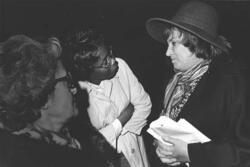Poetry as Protest: Adrienne Rich Fought for All Women
Audre Lorde, Meridel Lesueur, and Adrienne Rich in 1980.
Photo by K. Kendall on Flickr.
Born in 1929, Adrienne Rich was an American poet, essayist, and activist. Her father encouraged her to write from an early age. After getting married and giving birth to three children, Rich left her husband and began to write about issues of motherhood and feminism in her personal life. About ten years later, she came out as a lesbian, and began to explore this identity in her essays and poetry.
Rich once said, “In a time of frontal assaults both on language and on human solidarity, poetry can remind us of all we are in danger of losing–disturb us, embolden us out of resignation.” In other words, poetry has the power to express the things that unite us all as humans and can inspire us to work together toward a common goal.
To Rich, there is power in crossing the boundaries of backgrounds and different identities to express solidarity: “As a lesbian/feminist, my nerves and my flesh, as well as my intellect, tell me that the connections between and among women are the most feared, the most problematic, and the most potentially transforming force on the planet.” Rich tells us that there is power in bodies, specifically in the “nerves” and “flesh” of women’s bodies. Her words themselves are also powerful, showing us the way language can be a tool of human uplift that teaches us to work together to overcome the divisions and aggressions we face.
At my local Women’s March in January 2017, I felt the tempo of the protest and the tightening of the crowd. The combination of words and gestures felt poetic: rhythmic clapping that turned to sporadic cheering, loud chanting made louder by echoes, women supporting women with hugs and smiles. To me, this is what Rich was talking about when she referred to the combined power of women, and why that’s something for women to strive for, and something that others fear.
As a lesbian, feminist, Jew, and mother who inhabits all of these identities and advocates for women with these and other identities, Rich is an intersectional feminist. Sensitive to her “nerves” and “flesh,” she speaks across differences of embodied gender identity. While emphasizing embodiment, Rich also writes against essentialism, rejecting the idea that we are defined by our biology. In her essay, “Disloyal to Civilization,” she argues that white women, if they wish truly to be transformative agents, must join with women of color to challenge white supremacy. By highlighting what unites all of us as women while also naming the necessity for white women especially to be good allies to women of color, Rich registers the differing experiences of different women, thus exemplifying what it means to be an intersectional feminist.
Demonstrating the power of language to transform meaning, bring people together, and challenge injustice, Adrienne Rich’s poetry is a practice of protest. I’ve been thinking recently that protest can be poetry, too. At the March for Our Lives in Washington, D.C. last spring, some of the speeches were presented as poems, and even those written in prose had poetic elements. Exemplifying how poetry plays with time, Parkland student Emma Gonzalez paused in silence during her address. Initially puzzled, I realized six minutes later, along with everyone else, that Gonzalez’s pause was the length of the Parkland shooting. Like a lot of poetry, her protest required meaning-making through guesswork, translation, and personal interpretation.
Protests and poetry share a vocabulary of pauses, repetitions, and changing rhythms. Both can be disorienting and lack clarity, making sense only in retrospect. Both combine uncertainty and meaning, asking people to withhold judgment, and also to engage with each other and the world.
This piece was written as part of JWA’s Rising Voices Fellowship.








Really interesting!